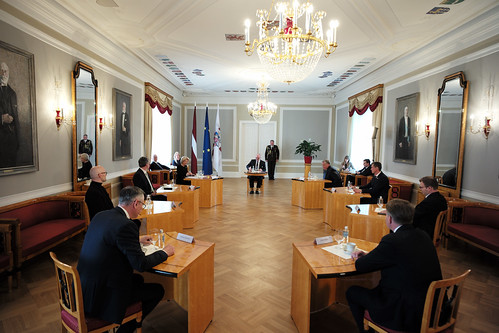‘Like many other democratic countries, we need to make sure our constitution has special tools for extraordinary events and circumstances (like war, state of exception or state of emergency). If absolutely necessary, using these tools, government could impose emergency rules that would have the same force as laws and protect the rights of other people and the democratic system, ensure public safety and well-being, including health, at times of crisis. Parliament would continue to operate normally during such extraordinary circumstances and could revoke such emergency rules at any time. Saeima would retain its control of the government and emergency rules would automatically become void as soon as special measures are lifted. As an additional safeguard, these rules would have to be approved by the president at least three days prior to entry into force,’ said Egils Levits during the meeting.
President Levits thanked Saeima for moving quickly to adjust its ways of working and continue to legislate in the new circumstances soon after emergency declaration: ‘Saeima has clearly demonstrated its ability to continue working and legislating despite given circumstances.’
President of Latvia, however, pointed out that due to democratic role of the parliament, and parliamentary procedures, legislature needs more time to adopt decisions compared to the government. Even if initiative is fast tracked as much as possible, it is unavoidable. In some extraordinary cases that might not be enough and even marginal delay in addressing particular threats could make a big difference. That is why constitutions of many countries provide their governments with special tools enabling them to rapidly respond to extraordinary circumstances. Moreover, Latvia needs to be prepared to face more serious situations – circumstances in which parliament might not be able to continue its work unhampered. ‘We have handled the current crisis quite well, but you can never know when this toolkit might become necessary, so it is better to be ready and learn from our current lessons,’ stressed Egils Levits.
Egils Levits noted that key principles of government’s response to crisis, agreed by the President and constitutional bodies during the joint meeting of 23 March 2020, have significantly improved the legal basis of government decisions. Nevertheless, these principles cannot fully compensate for the lack of clear constitutional rules.
President Levits specifically emphasised that this is a matter requiring a thorough parliamentary debate.
Commenting on issues raised by the President, Speaker of the Saeima Ināra Mūrniece revealed that the relevant parliamentary debate is already underway. Although there are different views about the wording and procedure for invoking the article, majority of MPs are ready to support a new, modern Section 81 of the Constitution that would meet the democratic standards. A balanced approach is highly advisable.
Participants of the meeting agreed that draft text of Section 81 prepared by President Levits is a good basis for further discussion in Saeima Legal Affairs Committee and Constitution working group.
Discussion then moved on to regional reform. President Levits reiterated that reform should boost the efficiency of local governments and access to adequate services in all municipalities, and also strengthen the democratic inclusiveness of local communities and their cultural and historical identity, which is one of the requirements of Constitution. ‘People’s involvement and interest in future of their community and representation of their interests should not suffer from this reform,’ stressed the President. According to Egils Levits, local communities should be given rights to democratically elect their representatives. Local communities should also be legally allowed to decide on matters of local significance.
President also noted that it is a democratic right of electoral alliances to register their lists for municipal elections. That would promote democratic participation of citizens in deciding local matters because some active citizens are not ready to join political parties. Contrary to national level, local governments are responsible for local policies that can also be decided by active citizens outside political parties.
President also promised to keep a close eye on further progress of regional reform.





